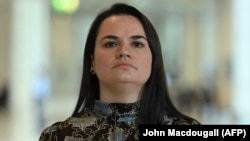Russia has issued an arrest warrant for Belarusian opposition leader Svyatlana Tsikhanouskaya, even as she says Moscow can play a role to mediate the political crisis in her country.
The Russian Interior Ministry database shows that Tsikhanouskaya is on its list of wanted persons.
An Interior Ministry source told Interfax on August 7 that the arrest warrant is a technicality, because one issued by Belarus also extends to Russia due to bilateral agreements between the two nations.
Tsikhanouskaya fled to neighboring Lithuania soon after protests erupted across Belarus against the results of the August 9 election, which extended strongman Alyaksandr Lukashenka’s 26-year rule.
Protests against Lukashenka have continued unabated for eight weeks despite a brutal crackdown, with several killed, hundreds injured, and more than 10,000 detained.
Tsikhanouskaya, who the Belarus opposition says won the presidential election, has called on Russian President Vladimir Putin to end his support for Lukashenka and warned against Moscow interfering in Belarus's affairs.
But she has also suggested that world leaders, including Putin, could help mediate talks with Lukashenka, a close yet often difficult ally of the Russian president.
Lukashenka has rejected repeated calls for dialogue with the opposition.
The Kremlin said on October 7 that Putin had no plans to meet with the opposition leader and dismissed her importance.
"No contacts are being planned," spokesman Dmitry Peskov told reporters, casting doubt on Tsikhanouskaya's role in her country's political life.
"Madame Tsikhanouskaya is not in Belarus. One can hardly say that she is somehow involved in Belarus's life," Peskov said. "She is meeting with various heads of state and government who consider Belarus's sitting president illegitimate."
Speaking in Berlin as part of a two-day trip to the German capital to drum up international pressure on the Minsk regime, Tsikhanouskaya reiterated on October 7 that she viewed Russia as a potential partner to moderate dialogue with Lukashenka.
A day after meeting behind closed doors with Angela Merkel, Tsikhanouskaya said the chancellor would be an ideal person to mediate the political crisis in her country.
Tsikhanouskaya said that Merkel is "aware of what’s going on there” and “would be really helpful in solving this problem.”
She laid out her aspiration following talks with Norbert Roettgen, a top lawmaker in Merkel’s Christian Democratic Union and chairman of the parliament’s foreign affairs committee.
“So, our main ask for [Merkel] was to be a leader in this mediation, to call for other countries to participate in mediation for starting these negotiations,” Tsikhanouskaya said.
Merkel has not indicated whether she would be willing to take on such a role, but Roettgen expressed Germany’s readiness to join international dialogue to resolve the crisis.
Merkel and Putin have a working relationship cultivated during countless discussions and negotiations on a wide range of global issues. During Merkel’s 15 years as chancellor, Putin is known to have spoken by phone with her more than any other world leader.
In earlier comments to German media, Tsikhanouskaya requested that Germany, the current holder of the European Union's rotating presidency, support expanded EU sanctions on Belarus, including putting Lukashenka on its blacklist.
Last week, the 27-nation bloc overcame a weeks-long political stalemate and agreed to impose visa bans and asset freezes on 40 Belarusian officials deemed responsible for electoral fraud and a brutal crackdown on protesters and opposition members.
Lukashenka is not on the sanctions list, but EU diplomats have said he may be added at a later date.
The European Union does not recognize the election results.





Facebook Forum